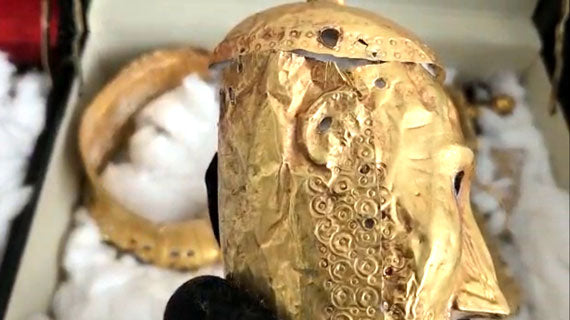اكتشاف القطع الأثرية الذهبية على عمق 20 قدمًا (6 أمتار) باستخدام eXp 6000

تم اكتشافها مع
OKM eXp 6000 Professional Plus
العمق: 6.0 m (19.7 ft)
المنطقة: Iran
القيمة المقدرة: EUR 10.000.000,00




كنوز ذهبية مشكوك في أمرها - اكتشاف غامض لـ eXp 6000
في إيران، اكتشف أحد الباحثين عن الكنوز في إيران باستخدام الماسح الأرضي ثلاثي الأبعاد OKM eXp 6000 Pro Plus ماسح أرضي من نوع eXp 6000 Plus، شذوذًا مذهلاً على عمق حوالي 20 قدمًا (6 أمتار). كشف التنقيب عن مجموعة مذهلة من القطع الأثرية: قناع ذهبي وأيادٍ ذهبية وعناصر زخرفية أخرى - وهو اكتشاف نادر ذو قيمة مادية وتاريخية هائلة.
إن محتوى الذهب الخالص وحده مهم للغاية، على الرغم من أنه لم يتم الكشف عن الوزن الدقيق حتى الآن. ولكن بعيداً عن قيمة المعدن، فإن الأسئلة الكامنة وراء هذه القطع هي التي تبهرنا: من كان يملكها؟ وكيف استُخدمت؟ وأي ثقافة استثمرت هذا القدر من الحرفية والرمزية في مثل هذه المجموعة؟
تتحدى القطع الأثرية سهولة تصنيفها. فأشكالها وأنماطها وتوليفاتها ليست قياسية على الإطلاق وتثير أسئلة أكثر مما تجيب عنها:
- هل هي قطع زخرفية بحتة أم جزء من مجموعة طقسية؟
- هل صُنعت القطع الأثرية للنبلاء أو الكهنة أو المحاربين؟
- ما هو الدور الذي لعبته الأيدي الذهبية الصغيرة في الواقع؟
- من أي عصر ومنطقة نشأت القطع الأثرية؟
- ما هي تقاليد الصاغة التي يمكن ربط هذا المستوى من الحرفية بها؟
هل تعرف المزيد عن هذا الاكتشاف؟شاركنا بأفكارك عبر البريد الإلكتروني!




قلادة لؤلؤة ذات معنى روحي محتمل

ارتبط اللؤلؤ والخرز بالمكانة والروحانية لآلاف السنين. عبر الثقافات - من مصر القديمة إلى العالم الإسلامي والبلاط الأوروبي - كانت مجوهرات اللؤلؤ ترمز إلى النقاء والقوة والحماية.
تجمع القلادة المكتشفة بين اللؤلؤ والذهب والأحجار الكريمة في مجموعة مذهلة. يوحي تأثيرها البصري بما هو أكثر من مجرد زخرفة بحتة: ربما كانت بمثابة قطعة وقائية أو احتفالية لشخص رفيع المستوى.
قلادة ضد الأرواح الشريرة؟
تشبه الأحجار الكريمة المدمجة في القلادة العيون. وهذا يذكّرنا على الفور بتمائم مثل الناظار، المعروفة في تركيا واليونان والشرق الأوسع، والتي يُعتقد أنها تحمي مرتديها من "العين الشريرة".
في حين أن تمائم النازار الكلاسيكية عادة ما تكون زرقاء زاهية، إلا أن الأحجار في هذه القلادة تبدو بنية اللون. ومع ذلك، يبدو منطق التصميم متشابهًا: عناصر شبيهة بالعين تراقب ما يحيط بها، وتهدف إلى حماية مرتديها من الحسد والكراهية وسوء الحظ. وما إذا كانت هذه القلادة قد استُخدمت بهذه الطريقة بالضبط سيبقى مجرد تكهنات - ولكن من الصعب تجاهل رمزية الحماية.

تاج أم حزام أم طوق احتفالي؟
عنصر آخر من عناصر الاكتشاف هو قطعة ذهبية كبيرة على شكل حلقة مع أحجار كريمة مدمجة ومفصلة. للوهلة الأولى، يمكن تفسيره على أنه تاج أو حزام أو قلادة - ومع ذلك فإن أبعاده لا تتطابق تماماً مع أي من هذه الوظائف. فهو يبدو كبيراً جداً بالنسبة لغطاء للرأس، وصغيراً جداً بالنسبة لحزام خصر كلاسيكي، وكبيراً جداً بالنسبة لقلادة نموذجية.
أحد السيناريوهات: قد تكون القطعة قد تم ارتداؤها فوق ثوب سميك أو مشد أو ربما استخدمت لتزيين حيوان في سياق طقوسي. وإلى أن يتم التعرف على القطع المقارنة، يبقى الغرض الدقيق منها سؤالاً مفتوحاً - وجزءاً من جاذبية هذا الاكتشاف.




اكتشاف كنز رائع بفضل كاشف أسطوري
مثل هذا الكنز المعقد والعميق ليس من قبيل المصادفة - إنه نتيجة استخدام التكنولوجيا المناسبة. لقد وثق المكتشف في جهاز OKM eXp 6000، وهو ماسح ضوئي أرضي احترافي ثلاثي الأبعاد قادر على تحديد مواقع الكنوز والتجاويف حتى عمق 82 قدم (25 م).
بالنسبة للباحثين الطموحين عن الكنوز فإن هذا النوع من الأداء هو ما يميزه حقاً: فبدلاً من عمليات البحث العشوائية، تحصل على رؤى قائمة على البيانات وخيوط واضحة حول أماكن الحفر.
يوفر eXp 6000 مجسات مختلفة لمختلف المهام:
- مسبار التلسكوب - مثالي للمسح السريع للمناطق الكبيرة.
- المجس الفائق - يكتشف الكنوز المدفونة وحتى رواسب الذهب الطبيعي.
- مستشعر النفق - يحدد مواقع الفراغات تحت الأرض مثل الأنفاق أو الكهوف.
- مستشعر LiveStream - يصور الشذوذات تحت السطح في الوقت الحقيقي.
قطع أثرية ذهبية أخرى
لم يكن القناع وعناصر التسخير والمجوهرات هي الاكتشافات الوحيدة. فقد اكتشف صائد الكنوز أيضاً العديد من الأواني الذهبية، وهي على الأرجح أوانٍ لأغراض طقسية أو زخرفية - على سبيل المثال لتخزين الأشياء الثمينة أو للاستخدام الاحتفالي. كل إناء مصنوع يدوياً ويعرض أنماطاً تفصيلية تبرز المستوى الاستثنائي للحرفية.




صياغة الذهب على أعلى مستوى




هذه الأواني هي أمثلة نموذجية للصياغة اليدوية الراقية للذهب. ومن المحتمل أنها شُكِّلت على الأرجح باستخدام تقنية تُعرف باسم "الرفع" أو "المطاردة": يتم تشكيل الصفائح المعدنية على البارد وتشكيلها بالطرق المتكرر بالأزاميل واللكمات والمطارق. وقد عُرفت طريقة التشكيل هذه منذ أكثر من 4,000 سنة واستُخدمت بالفعل في الحضارات القديمة المتقدمة مثل حضارة بلاد ما بين النهرين.
واليوم، عندما ننظر إلى هذه القطع الأثرية لا نرى الذهب فحسب، بل نرى أيضاً الدراية والوقت والقصص المستثمرة في كل خط وكل نمط - وكل ذلك تم اكتشافه بفضل جهاز الكشف الحديث.
هل تعرف المزيد عن هذا الكنز الاستثنائي؟نحن نتطلع إلى أدلتك عبر البريد الإلكتروني!
الأسئلة الشائعة: اكتشاف كنز الذهب باستخدام OKM eXp 6000
إلى أي عمق يمكن لجهاز OKM eXp 6000 اكتشاف القطع الأثرية الذهبية؟
في هذه الحالة، تم تحديد موقع القطع الأثرية على عمق حوالي 20 قدمًا (6 أمتار). وفي ظل الظروف المواتية، يمكن لجهاز eXp 6000 اكتشاف الهياكل والكنوز الأكبر حجماً حتى عمق 82 قدماً (25 متراً).
هل أحتاج إلى خبرة للعمل مع eXp 6000؟
إن eXp 6000 هو ماسح ضوئي أرضي احترافي. مع بعض التدريب، يمكن حتى للمبتدئين الطموحين استخدامه بنجاح. تدعم OKM المستخدمين بالوثائق والتدريب والاستشارات التطبيقية.
هل مثل هذه الاكتشافات الذهبية شائعة؟
لا - الاكتشافات بهذا الحجم والجودة والعمق نادرة للغاية. وهي عادة ما تكون نتيجة إعداد قوي وجهاز الكشف المناسب وجزء كبير من المثابرة.
هل البحث عن الكنوز باستخدام كاشفات OKM قانوني؟
تختلف المتطلبات القانونية باختلاف البلد والمنطقة. قبل استخدام جهاز الكشف الخاص بك، استوضح دائمًا القوانين المحلية واحصل على إذن من مالك الأرض وامتثل للوائح حماية التراث.
هل يمكن أن تساعدني OKM في مشروعي الخاص؟
نعم. إذا كنت تخطط لمشروع احترافي للبحث عن الكنوز أو الاستكشاف، يمكنك الاتصال بشركة OKM للحصول على توصيات بشأن الأجهزة والتدريب والاستشارات الخاصة بالمشروع.
Get Rewarded for Your Treasure Finds
You have also made discoveries and detected amazing artifacts and would like to share them (anonymously)? We look forward to reading and publishing your success stories!


